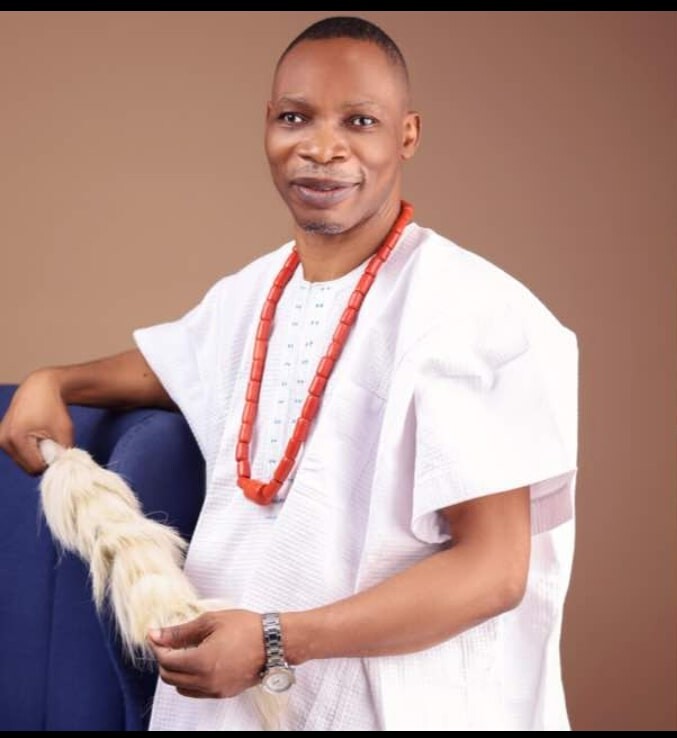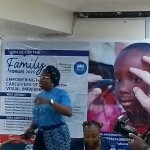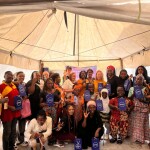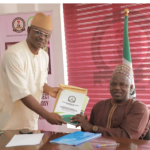Whatever snatched his sight couldn’t take his power to look—in the cloud. And all Ope sees: life and possibilities in gigabytes, for him and PWDs in Nigeria.
Elijah Olusegun
Live fast. Die young.
Ope Akinola thinks it’s part of life’s dynamics. And in the 53 years he’s been fortunate to be above ground, he never hesitates to drink life to the lees.
“Humanity is about expanding yourself beyond your limits. Although it comes with risks. No perfect order without chaos.” He swivels his head gently. He doesn’t have to look at the laptop he opened in his lap; his digits are at work on its hardware.
With the bad hand life dealt him as a kid, he grew up knowing he must test his own limits. And he did. The African Shrine, NIGERWIVES, Pain and Pleasure Band, ICT users in Nigeria’s disability communities, UNILAG girls and student unionists (the Pan African Youth Congress and others) and wheeler-dealers (1994), friends in Nigeria and the UK—all witnessed his adventure. Which is different from just dicing with death.
For the former, he had no choice. The stakes went high too early.
“Because they discovered my own visual problem early, I started school at Pacelli in 1976.” His tenor wafts a vivacity that equals the sound of the big-screened cartoons his two children are watching in the sitting-room.
Pacelli School for the blind and the Partially Sighted at Surulere, Lagos, indeed offered him the best of primary education. And even more. He would later join his brother at Ijanikin College, a secondary school then.
It wasn’t his choice. A WAEC consultant and volunteer at Pacelli took a shine to him. She prevailed on him to choose Ijanikin College over Kings College where Pacelli graduates usually go for post-primary education. “Mrs. Obi wanted me to mix with sighted students, and her son was there, too. She wanted to keep an eye on me.”
It all still came down to living the full, independent life.
“I and my elder brother fell into gutters a couple of times before we knew our way around the school, unaided,” he says. “Where we lived to the classroom then was about a kilometer.”
His son dashes in, and rushes up to the sitting room, holding a ringing phone, one of many buzzes that punctuate the hours-long interview that April noon. Ope is telling an old client the location of the hard disk, and the logs of programs that caught the bug in the man’s laptop operating system.
That’s how he gets calls from Edo, Delta, Oyo, Lagos, anywhere across Nigeria. He flies to those places most of the times. And on occasions like this, he dishes out freebies to old students, old clients, business centre operators, sound managers, music producers, and others. Most of them are PWDs whose computers or laptops or consoles need help.
He has single-handedly set up several computer business centres, including one for himself and a business partner. A lion will always give birth to a lion, he says. “My father had a flourishing transport system at Ijebu Igbo, and was doing very well for himself financially.” His father was about 30 then, a husband of many wives.
Ope says people called his father ‘doctor’. He wasn’t. But he managed one of the Ireti Oluwa chain of hospitals around Ogun then. He’d under-studied doctors enough to appear like one. “But he had even taken the Hippocratic oath,” Ope says, “and was counting down to his flight abroad to study medicine and surgery.”
So he rode out on one of his cruises around the town’s centre on his Suzuki that evening. It was how he unwound after the day’s work. Then something happened. He returned home later, led by the hand; his motorcycle also rolled in behind him, blackened, pooped out.
From Ope’s re-telling of that event, the devil was in the details. One, his father never had any accident that evening.
“The hospital CMD, Dr. Tunji Otegbeye, before he himself died years later, told me my father was a ‘very intelligent young man, and we couldn’t detect anything that physically went wrong with his eyes that night,” Ope says.
Back then, Ope’s sight, too, had started degenerating. His became the fourth case in a family of six children. Theories began to pop up.
“This is Africa. Most things are believed to be spiritual,” Ope says of his father’s blindness and the sense people teased out of it. He’s not sure he believes them.
About his death, however, at 33, in the circumstance Ope recalls they told him—something was not natural. “But I just don’t know.” Which means he knows. He later discovered it.
Anyhow, their father, his ambition, and fortune died in 1973. But his go-ahead strain lives on.
Ope’s elder brother, with whom he blundered around Ijanikin together, became a lawyer working in Ogun’s justice ministry. Their sisters (twins)—both landed plum jobs in the same bank in Ibadan, blind as they were. “One has emigrated, and she’s now an attorney for the US government,” he says.
Ope’s mother, the first of his father’s wives, died nine years after her husband.
All of these besetting a pre-teen could shake him for life. But he took them as grist to his mill. It wasn’t easy, though.
“I became very angry and aggressive in secondary school. I started fighting—fighting like beating up younger schoolmates trying to play pranks because they thought I couldn’t see. I could beat you now, and then reminded you how you hurt me last term,” he says, laughing.
Pacelli knew Ope and other blind pupils it raised would have peer problem and discrimination after settling in, especially in a mixed school. “They did everything to make us up to the standard in every academic area. We could use the typewriter, the braille, the mathematical set. We could measure dimensions mentally.” The pupils usually covered the whole of primary school syllabus, and moved up as far as JSS 2 syllabus before they left Pacelli. The two Irish sisters running the school then employed the best of special education teachers. “The sisters, Handmaids of the Holy Child, were good themselves, though they never studied special education,” he says. Among his teachers was Mrs. Koya. She was on the team Lagos eventually sent to Japan to study inclusive education.
Apart from the staff, there were also volunteers, like Mrs. Obi, NIGERWIVES founder and Nigeria’s foremost braille expert, he says. There were Megan Adesanya and others, too. These expatriates (NIGERWIVES) married Nigerian men working in Shell and other big companies across Nigeria. “They’d come and teach us how to cook, iron our clothes, sew, weave, walk around, play musical instruments, and all that so we would not have to depend on people too much.” He could tell how much they wanted him and others to have no room for self-pity out there.
And when he got to Ijanikin Ope simply became a phenom. He led the math class, and became the overall best in JSS 1. He wowed his history teacher in SSS so much the man asked if Ope himself set the exam questions.
Even out of class, he was nobody’s slouch. He bunked off school like others, and regularly hoofed it as far as Mile 2, alone. He joined his classmates to hunt for cashew and other wild fruits in the bush. That free-spiritedness had a different sizzle to it later on campus. “I was rough; I was smooth. I was everything I wanted to be. I’d go to Fela Shrine. Weekends, we’d pack girls into my car, and we’d go to beach,” he says, laughing. His sister left her car for him. “My roommate had his own, but he’d drive mine.”
Back in his Ijanikin days, Ope still had a blast—impish and woodsy as it was. But his energies in and outside class riled up the baddies among his classmates. He became a target. One particular boy went into his locker, and destroyed his typewriter.
It happened the Nigeria Educational Research and Development Council (NERDC) that supplied the school embossers to braille their reading materials slackened along the line. He had a tough time studying as he used to do.
“At a point the junior students reading to me during break started excusing themselves. They’d run off after some minutes,” he says. One of them later told him, in confidence, his classmates intimidated and warned them to stop reading to him. “They said I was performing better than they sighted students.”
Those brats—and even some of his classmates at UNILAG—did that not because he had visual challenges. “It was the only way they could feel good—by making me unhappy.” A flummoxed classmate at UNILAG couldn’t bottle it all up again. He confronted Ope after a test, and asked how he could score nine out of 10, blind as he was, and he the acclaimed class brainbox eight. “I didn’t even bother to answer him. I just left.” He had the grace to take the insult because his own outlook on life was changing. Again, it took all sorts to make the world at UNILAG then. One of the good lots were some Catholic students: The Legionnaire. They became a godsend to blind students on campus since the NERDC refused to revive the braille service. One of them, Joachim Adeyemi, chose to be his reader. The Legionnaire read and recorded and typed out textbooks for blind students.
He remembers how the first embosser problem at Ijanikin drove him to his wit’s end. “I started fiddling with the damaged braille embossers. I ended up damaging them more than I was fixing them.” But nothing was lost. The attempt became the primer that fired him—even across the Pond—to reach for the full living which technology mastery could give him and other PWDs.
Years after he graduated from the history department at UNILAG in 1994, he first went to teach at Pacelli in 1999. Then he landed another one at NIGERWIVES—as Nigeria’s first computer instructor and curriculum designer for the blind. His mentor Obi was at the helms then. He learnt how to fix damaged embossers here eventually.
Whatever he lost with his sight, Ope has found it multiple times with his guided fingers—on computers. The deputy ICT manager of the Vanguard Newspaper describes him as a computer accessibility ‘guru’. “You can’t find anyone like him in Nigeria,” Akintayo Eribake says.
Pain and Pleasure band’s symphony first attracted the computer science graduate to the band leader. A brother had earlier linked him, a sound engineer on the side, with Ope, a self-made keyboardist and guitarist (he taught himself French, Italian and German, too). “When I saw how he does everything using shortcut keys, I decided no going back.” He eventually taught Eribake how to assemble computers.
That was how Ope plodded along on the information super highway, setting milestones for assistive technology adoption for Nigerians with visual impairments. “There was no smartphone in Nigeria when he started using JAWS in feature phones, and installing for others,” Eribake says. In hindsight, the quest began in 1976, when he started out at Pacelli, with the desire to live a life full and independent. He has now found ICT, and he’s going big on its deployment and advocacy to enrich the lives of Nigerians with disabilities.
At some point in NIGERWIVES, Ope discovered pounding out commands and teaching computer apps to generations of blind students started losing its mojo. He began gutting out the boxes any time there was a breakdown. By the time he sent the first system on the fritz, his boss had to stop him cold. At that time, one of the first computer service companies in Nigeria was a NIGERWIVES’ consultant. A member was linked to the company. Ope asked their engineer Ayo Enitilo if a blind person could learn to assemble a desktop. Why not?
They struck an arrangement: Ope would buy the components; Ayo would come weekends to train him. “He’d come to UNILAG, where I squatted then, to train me,” he says.
Ope was not exactly learning how to cobble up the hardware when they started. “I wasn’t using my sight during the training.” It appeared he concentrated more on understanding the technology.
How?
He pans his head. His boy bursts in again with the phone. It announces the caller. “I won’t be able to take that now because she talks at length whenever she calls.”
Each time he rotates his head—and he has done that a couple of times so far—he’s trying to move the available line of sight of each eye to the extreme left. “The central vision in each eye has been damaged. But I can see white light and people’s outlines with the extreme ends,” he says. “Retinitis Pigmentosa doesn’t really finish the job.” The joviality in his voice is infectious. “It damages and discolors the retina. But there could be comorbidities.” His is macular degeneration, which attacks the black of his eyes as he ages.
For his lost central vision, he sharpened his faculty to make out tactile differences among cables, ports, integrated circuits, and all other parts of a computer. So the training booted up, and never aborted for once.
“Makers of hardware provide for differences and eventualities. If you can’t complete what you start on a gadget, somebody else should be able to take over and continue,” he says. “I can’t see colors. But when he told me the port where a red cable would go, I would feel it, note the difference, any difference, from the other port for the other cable. So I can tell you which cable is red.”
This know-how still stuns Eribake. He confesses he learnt a lot from Ope in computer practicals. But everyone doesn’t watch wide-eyed like Eribake.
Ope once guested in at a TV studio in Ibadan for a programme the state’s special adviser to the governor on disability affairs hosted. Neither the host nor his guest could see. A caller pushed his skepticism too far that day. He called in, and accused the host of pulling wool on viewers’ eyes by bringing a blind bat claiming he was a computer engineer.
“So I told the cameraman to focus the computer. I unscrewed it, kept the screws in my pocket. I told the cameraman to zoom in on the system. Then I went for the hard disk, announcing it and its specification. I unplugged a cable, and announced its name and colour. I went on until the caller had to call back. He accepted that episode wasn’t a fraud.”
Ope believes ICT is the liberator, the pathway to help Nigerian PWDs live fully, more independently, and reach their potentials.
“PWDs develop the program for the last NASA flight into space. Nigerians with disabilities can go that far, too,” he says. He fingers some components in the Nextford University-stamped laptop in his lap, and explains their functions.
Ope kept having brainwaves about ICT—ideas beyond just teaching and coupling and mending broken-down computers. But NIGERWIVES didn't resonate with these. The organization seemed contented helping the blind use shortcuts to do Excel and Power Point and others. It rebuffed Ope’s desire to push the envelope. But his passion waxed stronger than the bond he had with NIGERWIVES.
He told them what he planned.
Obi, surprised, said he wanted to go and set up a consultancy. He didn’t care a fig about that conclusion.
He quit.
Joachim can say a little about Ope and his determination to go beyond limits. “Look at what he’s doing in ICT now. From history. He doesn’t allow anything to restrict him,” the insurance expert says.
Now, after daring to move, his drive has sprung up a business (he supplies assistive devices, and consults on assistive technology); it has also picked up the momentum of advocacy. He’s been on a couple of projects with Microsoft and HP. “Our startup Accesstech Innovation is one of the five recipients of the 2023 Microsoft AI for Accessibility Grants,” he says. It’s Nigeria’s first experience centre for all things assistive technology for visual impairments. His passion and business, no doubt, exploded full-on after he returned from completing his Chevening scholarship at University of Leeds, UK, for a masters in disability studies. He specializes in assistive technology, including its policy aspect.
For the advocacy, he says, the reward for hard work is more work. He particularly likes to ‘look’ at the motive power of his Pacelli predecessor and mentor, Dr. Danlami Bashari, the two-term chairman of the UN Committee on the Rights of PWDs. What Ope ‘sees’ each time won’t make him step off his own accelerator. There’s so much ground to cover. That is considering the stretch he has covered before and after his tenure as chairman of the Nigeria Association of the Blind, Lagos chapter. He has no figure to it himself, in terms of nose counts or mileage. But reports abound he’s touching many lives. Men, women, and students with disabilities are going places in their careers, business, and education (UNILAG’s disability community knows) after their paths cross. One of his former students, whose call he deferred the other time, is a blind lady working at Shell Petroleum Company’s customer service.
To describe how Ope has touched people personally is a problem for Eribake. “Everything he does is personal. More than 14 of us were living his apartment then. We were eating his food. Just mentioned his name or the blind people’s home in Ikorodu, they would bring you to his house,” he says. Joachim has no description good enough, either. But he has one experience—of Ope’s insights—that won’t leave him.
He was praying and fasting at that time on campus, and Ope knew about it. He suggested to Joachim to break the fast with the Eucharist. That might not be anybody’s kind of epiphany. But Joachim believes flesh-and-blood couldn’t have revealed that. “I have never stopped breaking my fast with the Holy Communion since then,” he says.
Peter Adeniran, an instrumentalist in the band, can only see Ope with his mind’s eye. So description of what he sees about him becomes a little tricky. But like Eribake, Peter knows what Ope means to him: “a father, brother, boss, and friend”. He taught Peter how to set-up and run a sound studio, and produce songs with ICT. Where he couldn’t deploy software and hardware to add value, Ope dug in his hooks, and taught by example. “This was somebody feeding us, housing us. If he returned from work, he’d go to the kitchen, and wash dirty plates, without complaining. Meanwhile, we were home all day,” Peter says. That letting-go of Ope’s also extended outside their Ikorodu home. And it was annoying. The housemates liked to do some shadowboxing whenever neighbours took them for granted. Peter says Ope frowned at such tendency. “He’d warn us it was nothing to fight about. ‘Leave it to God’.”
How the wasp of a young man transformed to a dove now didn’t happen overnight. Something planted the seed in his young mind way back. The auntie he lived with didn’t come for him at the end of a particular term at Pacelli. Ope had to navigate his way to Sango-Ota. A cabbie singled him out of the waiting commuters at a bus stop. The man refused to pick up any passenger again. Ope settled in, and locked the door. “He should be one of them,” the man murmured, and taxied off.
Up till his UNILAG time when the light had started shinning in his angry soul, Ope’s classmates and friends still froze around him. He once responded with ‘really!’ to a friend’s remark in a hangout. The friend started pleading, walking back his harmless statement. “Really!”, in Ope’s first life, meant the calm before the storm. And everybody knew him—for his brittle temperament, his vengeful and unforgiving spirit. He’d vow to never help somebody that offended him. And he meant it. “But I usually found out I came out the worse for it. And the other person would still get the help elsewhere,” he says. “At a point, I had to admit my destiny doesn’t tolerate me being an oppressor.”
Alone in the taxi, he started fielding questions from the driver. “He asked me whom I was—my father. I told him,” Ope recalls. The cabbie asked if he ever heard about a man called Baba Sheri. “My family used to mention that name as one of my father’s workers.” The driver identified himself as that man. “He said my father bought him his first car, and that my father was a very good man, and I had better be good to people like my father was.”
On his motorcycle that evening, his father saw a flash from nowhere, Ope remembers. No rain. His eyes took in the blinding intensity, and shuttered. In the darkness that followed, he slid off his motorcycle. The flash had entered the two-wheelers, and set off an explosion. “It was a sister of my mum’s who was luckily on the scene that led my father home,” he recalls the account he heard.
So many years after he died, Ope thought, here’s one among the many people still talking good of his father.
The cabbie stopped for Ope in front of his auntie’s house, and drove off.
That encounter struck a chord in him, with lots of life-changing overtones. Things happened in the years that followed: he subscribed to the Christian faith, and now makes Bible teachings on love and other virtues his principles. He also met some of his scared former classmates at a get-together in the UK. Everyone watched out for his short fuse. “I started joking, talking, and laughing—they couldn’t believe it,” he says. He jazzed up the gathering that day for everybody to let loose.
Now he shares his sunny smile and other things people can benefit from. His band members talk about his large heart, though he’s not on Forbe’s rich list. “Everything is not money to me, even as an entrepreneur who takes his bottom-line seriously,” he says. Relationship matters more. Profit-sharing threatened that relationship in Pain and Pleasure he founded and grew for 14 years. He simply turned his back. Not absolutely, though.
As much as he nurtures relationship, he still draws certain lines nobody crosses. “That was what my dad didn’t do, and they got him,” he says. “But I will protect myself.”
That adds up.
There’s so much ahead for him to stay alive. Especially as he believes ICT is getting better and wider. “And this is how I am going to work till I drop dead.”







